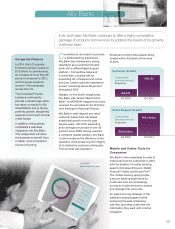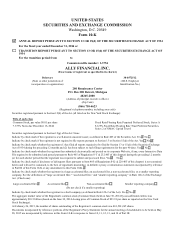Ally Bank 2014 Annual Report Download - page 19
Download and view the complete annual report
Please find page 19 of the 2014 Ally Bank annual report below. You can navigate through the pages in the report by either clicking on the pages listed below, or by using the keyword search tool below to find specific information within the annual report.
Table of Contents
Ally Financial Inc. • Form 10-K
7
Other Regulations
Some of the other more significant regulations that we are subject to include:
• Privacy — The GLB Act imposes additional obligations on us to safeguard the information we maintain on our customers, requires
us to provide notice of our privacy practices, and permits customers to “opt-out” of information sharing with unaffiliated parties.
The U.S. banking regulators and the Federal Trade Commission have issued regulations that establish obligations to safeguard
information. In addition, several states have enacted even more stringent privacy and safeguarding legislation. If a variety of
inconsistent state privacy rules or requirements are enacted, our compliance costs could increase substantially.
• Fair Credit Reporting Act — The Fair Credit Reporting Act regulates the use of credit reports and the reporting of information to
credit reporting agencies, and also provides a national legal standard for lenders to share information with affiliates and certain third
parties and to provide firm offers of credit to consumers. In late 2003, the Fair and Accurate Credit Transactions Act was enacted,
making this preemption of conflicting state and local law permanent. The Fair Credit Reporting Act was also amended to place
further restrictions on the use of information shared between affiliates, to provide new disclosures to consumers when risk-based
pricing is used in the credit decision, and to help protect consumers from identity theft. All of these provisions impose additional
regulatory and compliance costs on us and reduce the effectiveness of our marketing programs.
• Truth in Lending Act — The Truth in Lending Act (TILA), as amended, and Regulation Z, which implements TILA, requires
lenders to provide borrowers with uniform, understandable information concerning terms and conditions in certain credit
transactions. These rules apply to Ally and its subsidiaries in transactions in which they extend credit to consumers and require, in
the case of certain mortgage and automotive financing transactions, conspicuous disclosure of the finance charge and annual
percentage rate, if any. In addition, if an advertisement for credit states specific credit terms, Regulation Z requires that such
advertisement state only those terms that actually are or will be arranged or offered by the creditor. The CFPB has recently issued
substantial amendments to the mortgage requirements under TILA, and additional changes are likely in the future. Failure to
comply with TILA can result in liability for damages as well as criminal and civil penalties.
• Sarbanes-Oxley Act — The Sarbanes-Oxley Act of 2002 implemented a broad range of corporate governance and accounting
measures designed to promote honesty and transparency in corporate America. The principal provisions of the act include, among
other things, (1) the creation of an independent accounting oversight board; (2) auditor independence provisions that restrict non-
audit services that accountants may provide to their audit clients; (3) additional corporate governance and responsibility measures
including the requirement that the principal executive and financial officers certify financial statements; (4) the potential forfeiture
of bonuses or other incentive-based compensation and profits from the sale of an issuer's securities by directors and senior officers
in the twelve-month period following initial publication of any financial statements that later require restatement; (5) an increase in
the oversight of and enhancement of certain requirements relating to audit committees and how they interact with the independent
auditors; (6) requirements that audit committee members must be independent and are barred from accepting consulting, advisory,
or other compensatory fees from the issuer; (7) requirements that companies disclose whether at least one member of the audit
committee is a “financial expert” (as defined by the Securities and Exchange Commission (SEC)) and, if not, why the audit
committee does not have a financial expert; (8) a prohibition on personal loans to directors and officers, except certain loans made
by insured financial institutions, on nonpreferential terms and in compliance with other bank regulatory requirements; (9) disclosure
of a code of ethics; (10) requirements that management assess the effectiveness of internal control over financial reporting and that
the Independent Registered Public Accounting firm attest to the assessment; and (11) a range of enhanced penalties for fraud and
other violations.
• USA PATRIOT Act/Anti-Money-Laundering Requirements — In 2001, the Uniting and Strengthening America by Providing
Appropriate Tools Required to Intercept and Obstruct Terrorism Act (USA PATRIOT Act) was signed into law. Title III of the
USA PATRIOT Act amends the Bank Secrecy Act and contains provisions designed to detect and prevent the use of the
U.S. financial system for money laundering and terrorist financing activities. The Bank Secrecy Act, as amended by the USA
PATRIOT Act, requires BHCs, banks, and certain other financial companies to undertake activities including maintaining an anti-
money-laundering program, verifying the identity of clients, monitoring for and reporting on suspicious transactions, reporting on
cash transactions exceeding specified thresholds, and responding to requests for information by regulatory authorities and law
enforcement agencies. We have implemented internal practices, procedures, and controls designed to comply with these anti-
money-laundering requirements.
• Community Reinvestment Act — Under the Community Reinvestment Act (CRA), a bank has a continuing and affirmative
obligation, consistent with the safe-and-sound operation of the institution, to help meet the credit needs of its entire community,
including low- and moderate-income persons and neighborhoods. The CRA does not establish specific lending requirements or
programs for financial institutions. However, institutions are rated on their performance in meeting the needs of their communities.
Failure by Ally Bank to maintain a "satisfactory" or better rating under the CRA may adversely affect Ally's ability to make
acquisitions and engage in new activities, and in the event of such a rating, the FRB must prohibit the FHC and its subsidiaries from
engaging in any additional activities other than those permissible for bank holding companies that are not FHCs.
Employees
We had approximately 6,900 and 7,100 employees at December 31, 2014 and 2013, respectively.
























